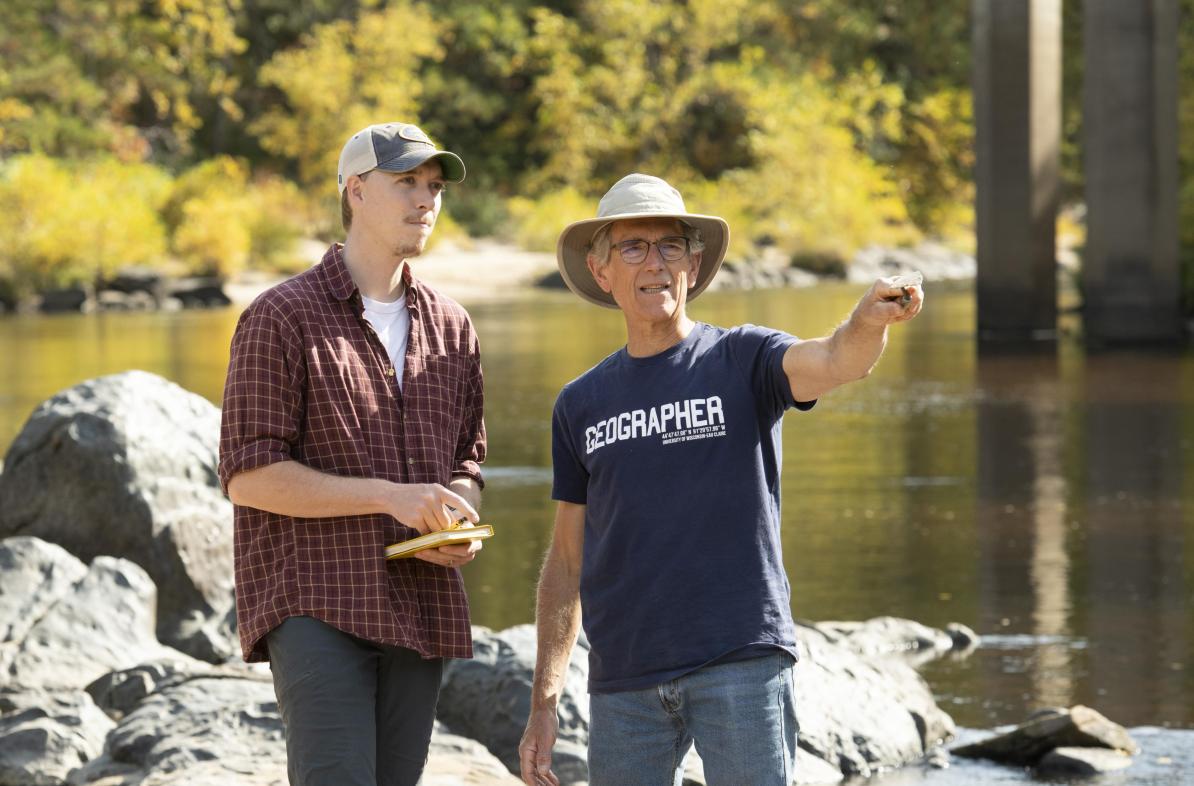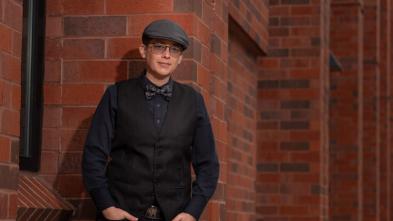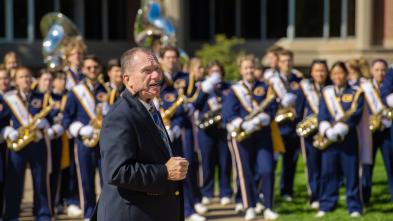
UW-Eau Claire alum returns to campus to work alongside former faculty mentors
Drs. Doug Faulkner and Zach Hilgendorf — geography faculty members at the University of Wisconsin-Eau Claire — have spent many hours doing fieldwork together on western Wisconsin riverbanks.
However, this fall was the first time the researchers spent time together in the field as professional colleagues rather than as a professor mentoring an undergraduate student.
Hilgendorf, who graduated from UW-Eau Claire in 2015, is a visiting assistant professor of geography at his alma mater, teaching Faulkner’s courses while his former faculty mentor is on a sabbatical.
“I couldn’t be happier,” Faulkner says of Hilgendorf’s return to campus. “Zach was a pleasure to have as a student; it’s an even greater pleasure to have him as a colleague.”
Working with Faulkner as a fellow faculty member feels only “marginally different” than working with him when he was a student because he’s always treated him as a “junior colleague,” Hilgendorf says.
“I was very, very driven when it came to the subject matter and research questions, so he kept pace with what I threw at him,” Hilgendorf says. “Now, as a ‘true’ colleague, I’m able to take the things I’ve learned, and I think bring a bit more to the table.”
Inspiring students
Faulkner says Hilgendorf’s passion for higher education and geography will inspire his students to learn. He’s also “tremendously empathetic” because Hilgendorf was a student here not so long ago, he says.
“He remembers well what it was like to be an undergrad and the various challenges that come with the undergrad experience,” Faulkner says. “Empathy is a quality that will allow him to connect with students and earn their trust. Students who have him as a professor are fortunate indeed.”
Dr. Harry Jol, a professor of geography who also was one of Hilgendorf’s research mentors, agrees, saying that while his former student remembers how things were done, he’s also seeing the department with “fresh” eyes. That’s been valuable as they’ve worked together to co-teach classes, Jol says.
Returning to his alma mater to teach — something he says has been a longtime dream — is every bit as rewarding as he hoped it would be, says Hilgendorf, who graduated from UW-Eau Claire with a major in environmental geography, a marketing minor and a geospatial information sciences certificate.
“I enjoy my students, I’m very passionate about all of the courses I am teaching, and can’t wait to see what the future holds,” Hilgendorf says.
His experiences as a student at UW-Eau Claire are helping shape how he approaches his own teaching and mentoring of undergraduate students, Hilgendorf says.
It was his professors’ motto, “we’re not teaching students, we’re training colleagues,” that inspired him as a student to think differently about what his relationship with his professors could look like. It also helped him begin to see himself as a “scientist” for the first time.
“They taught me to not be afraid to ask questions, express ideas or develop my own hypotheses,” Hilgendorf says of his UW-Eau Claire geography professors. “Without those experiences, I may not have found the same passion for geography and fieldwork that I have today.”
For Faulkner, seeing a former student return to the department to teach gives him “a strong sense of professional fulfilment.” Hilgendorf already has accomplished much in his brief academic career and has the “skills, knowledge and disposition for achieving much more in the future,” he says.
“Knowing I played at least a small role in his academic development is highly gratifying,” Faulkner says.
Finding his path
Hilgendorf began his college career at a large university with a full scholarship. When he struggled with his classes and lost his scholarship, he knew he needed a smaller campus, smaller classes and a smaller community. UW-Eau Claire checked all the boxes.
It was in a UW-Eau Claire geography course where Hilgendorf discovered that geography is more than knowing how to read a map — it’s a field that helps people understand the human, cultural and physical worlds, he says. Once he understood what it offered, he was “entirely hooked,” he says.
“Here was a world — geography pun intended — that finally clicked with me,” Hilgendorf says of geography. “I could explore nearly anything and everything, given that geography is the science of space and place, and work to improve our physical world.”
He still was new to the major when he asked Faulkner about his research along the Chippewa River.
“The very next week I was out kayaking on the river, helping survey an invasive species that a fellow undergrad was working on for his capstone project,” Hilgendorf says. “Doug’s passion for research, his passion for science and his passion for teaching were infectious.”
When the time came for his own capstone project, Hilgendorf shared an idea about the Chippewa River with Faulkner “that I was certain was wrong.”
“His face lit up and, before I knew it, we were setting up a question and an Office of Research and Sponsored Programs grant to test out this theory,” Hilgendorf says. “That led to a summer of driving all over the lower Chippewa River valley, locating and mapping the features we were interested in.”
He says Faulkner taught him “how to be a scientist, a researcher and a passionate educator.”
Faulkner says that even in a geography department that included many talented students, Hilgendorf stood out.
He was eager to learn, had a positive attitude, good-natured personality and an “irrepressible curiosity about everything,” Faulkner says.
“Despite a rocky start to his undergraduate career, he didn’t turn sour and give up,” Faulkner says. “Instead, he transferred to UWEC and pushed ahead, seemingly confident he’d find his passion and a subject in which he would excel. He did just that, with flying colors.”
Jol says that as an undergraduate, Hilgendorf “was a go-getter always working away on classwork and looking for extra opportunities to learn.” That energy and curiosity will serve him well in his teaching role, he says.
In addition to Faulkner and Jol, Hilgendorf worked on undergraduate research with Dr. Garry Running, professor emeritus of geography. All three “treated me as a colleague and taught me a considerable amount about how to be a geographer and a scientist,” Hilgendorf says.
After graduating from UW-Eau Claire, Hilgendorf says graduate school seemed like the logical next step. Since he always had an interest in teaching, he decided to “go the whole way and become a professor.”
Coming full circle
As a visiting assistant professor, Hilgendorf primarily teaches geography classes, but he also is mentoring students and is involved in existing and new research.
Ten years after “stumbling” into the field of geography, Hilgendorf says he’s excited to again be engaged in research with UW-Eau Claire faculty and undergraduate students.
Currently, he’s collaborating on a project with Jol, who invited Hilgendorf to join him on research involving the significant erosion and other hazards in a region near Duluth, Minnesota. During a summit with partners from businesses, the community, city and governmental agencies, and education institutes, Hilgendorf applied his methodology to determine what UW-Eau Claire faculty and students can contribute, Jol says.
Hilgendorf also is beginning a new collaborative research project with an environmental geography major.
He hopes he can do as much for the students he mentors as his UW-Eau Claire mentors did for him.
“UW-Eau Claire is really a special place,” Hilgendorf says. “When I came here, I’d just lost a very large scholarship, I didn’t know what life would hold for me and I was at a crossroads. Without incredible mentors and a department that feels like one big family, I’m not sure where I would be today. They cultivated a passion that has shaped my life.
“I’m truly honored to be back, teaching and researching alongside them.”
You may also like


